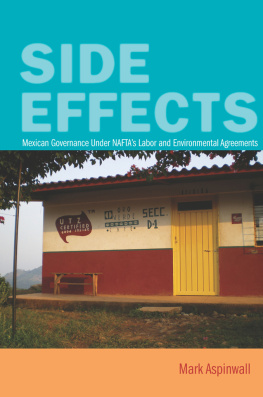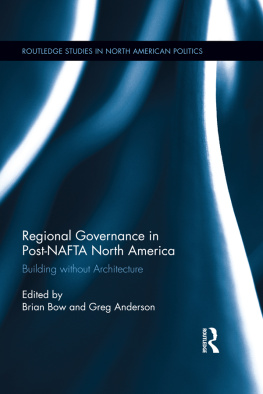Stanford University Press
Stanford, California
2013 by the Board of Trustees of the Leland Stanford Junior University. All rights reserved.
No part of this book may be reproduced or transmitted in any form or by any means, electronic or mechanical, including photocopying and recording, or in any information storage or retrieval system without the prior written permission of Stanford University Press.
Printed in the United States of America on acid-free, archival-quality paper
Library of Congress Cataloging-in-Publication Data
Aspinwall, Mark, author.
Side effects : Mexican governance under NAFTAs labor and environmental agreements / Mark Aspinwall.
pages cm
Includes bibliographical references and index.
ISBN 978-0-8047-8229-6 (cloth : alk. paper) ISBN 978-0-8047-8230-2 (pbk. : alk. paper) ISBN 978-0-8047-8478-8 (e-book)
1. Administrative agenciesMexico. 2. Environmental policyMexico. 3. Environmental lawMexico. 4. Canada. Treaties, etc. 1993 Sept. 13. 5. Labor policyMexico. 6. Labor laws and legislationMexico. 7. Canada. Treaties, etc. 1993 Sept. 14. 8. MexicoPolitics and government19882000. 9. MexicoPolitics and government2000- I. Title.
JL1242.A79 2012
354.30972dc23
2012022089
Typeset by Westchester Publishing Services in 10/14 Minion
Preface
In September 2008, The Mexican center for environmental law (CEMDA), a nongovernmental organization, celebrated its fifteenth anniversary in Mexico City with a gathering of several hundred activists, supporters, politicians, and civil servants. The keynote speaker was Juan Elvira, secretary of the environmental ministry, SEMARNAT. Elviras presence was a sign of how far environmental politics had moved. Twelve years earlier, CEMDA had filed a landmark complaint about Mexicos failure to respect its own environmental law, which infuriated SEMARNAT. The ministry broke off all interaction with the fledgling NGO, calling it anti-Mexican. Now, twelve years later, CEMDA was a central pillar in Mexican environmental governance.
Non-co-opted labor leaders in Mexico can only dream of the success that environmentalists achieved by 2008. For them, its hard to imagine that the secretary of the labor ministry would be an honored guest (or accept an invitation) to a gathering of independent labor activists. Whereas environmental authorities listened toindeed, eventually welcomedthose who were seen initially as dissident and troublesome, the same collaborative scenario does not appear to be possible for labor. In labor, corrupted institutions leave many feeling that politics remains a question (to paraphrase Harold Lasswell) of who steals what, when, and how.
This is a story about governance in Mexico. On January 1, 1994, two spotlights were switched on simultaneously, one shining on Mexicos environmental authorities, the other on its labor authorities. The spotlights (which also shone on Canada and the United States) came from the labor and environmental accords that accompanied the NAFTA treaty. These so-called side agreementswith their requirements to respect the rule of lawprovide a natural experiment because in important ways they are very similar. They offer a valuable opportunity to compare their respective effects on two different sectors, each with its own constellation of domestic agencies and interests. This comparison takes us beyond traditional international relations studies of governance and into the very heart of domestic agencies. Most studies treat the state as a unit, buffeted by demands from global organizations and networks of activists. Here we get a far clearer understanding of what works and what doesnt in terms of how external incentives can lead to improvements in governance.
Across the world, developing countries are finding that the transnational regimes they joinwhatever their original purposeratchet up the pressure on their systems of regulation, governance, and norms. Trade and investment agreements affect regulatory standards (such as environmental, safety, labor, and consumer), modes of governance (accountability, transparency, participation, rule of law), and behavioral norms (over individual and group rights, for example). But external-origin pressures are not always transmitted formally through international organizations, transnational integration agreements, or partner states. They can be felt informally, too, through transnational advocacy networks and ad hoc bilateral or multilateral pressure.
How exactly are these pressures received by the agencies of the target country? Why do some agencies in a given state accept that the old ways of doing things need to change before other agencies in the same state? I began this project by focusing on rule of law because the NAFTA side agreements stipulate that member states enforce their own laws and because that was the original rationale of the accords. But I quickly found that the picture was more complicated, and, like many books, the end was different from what I imagined at the outset. The picture was complicated because compliance and law enforcement showed both good news and (plenty of) bad news. In many cases, compliance remained poor, corruption was rampant, and officials prioritized development over rule of law. But it was also complicated because rule of law turned out to be as much about attitudes as results. Attitudes had begun to shift in the federal environmental agencies, but much less so in the labor agencies.
And it was not simply rule of law but also policies, institutions, procedures, and practices where results mattered. Something new was happening. Spurred on in large part by the NAFTA side agreements, Mexico was strengthening impact assessment and permitting processes, and it was improving workers rights. New laws were brought into effect. Disruptive, non-co-opted interests were consulted. Public meetings created new opportunities for citizen participation. In some cases, institutions themselves were changing. Communication with agency officials in the United States (and, to a lesser extent, Canada) shot up. Officials were trained in new procedures. In short, capacity and oversight were strengthened. True, in many cases these changes were limited and strategically designed to satisfy external auditors. And not all change was NAFTA-inspired. The courts and independent domestic agencies played a role of their own. But a real process of change had beguna regional agreement designed to liberalize trade now had another effect, this time on governance.
The highlight of the story is the strengthening of civil society. Starting from a strong preference for co-opted, compliant interests, federal environmental agencies now welcome dissident voices. They hire professionals from NGOs to fill civil service positions, and they draw civil society groups into wider discussions about environmental governance. For their part, environmental NGOs have learned how to be players in the system: they make fewer unrealistic requests, and they do not take to the streets when they dont get everything they want. They have advanced degrees in law, sciences, and administration. They have become professionals.
Capacity was built among labor interests, too, because independent (non-co-opted) unions, research organizations, lawyers, and NGOs created links with like-minded groups in the United States and Canada, filed complaints together under the labor side agreement, and forged new understandings, new expertise, and new opportunities. But labor agencies and traditional union confederations continue to resist incursion from independent unions and activists. Labor suffers from a











